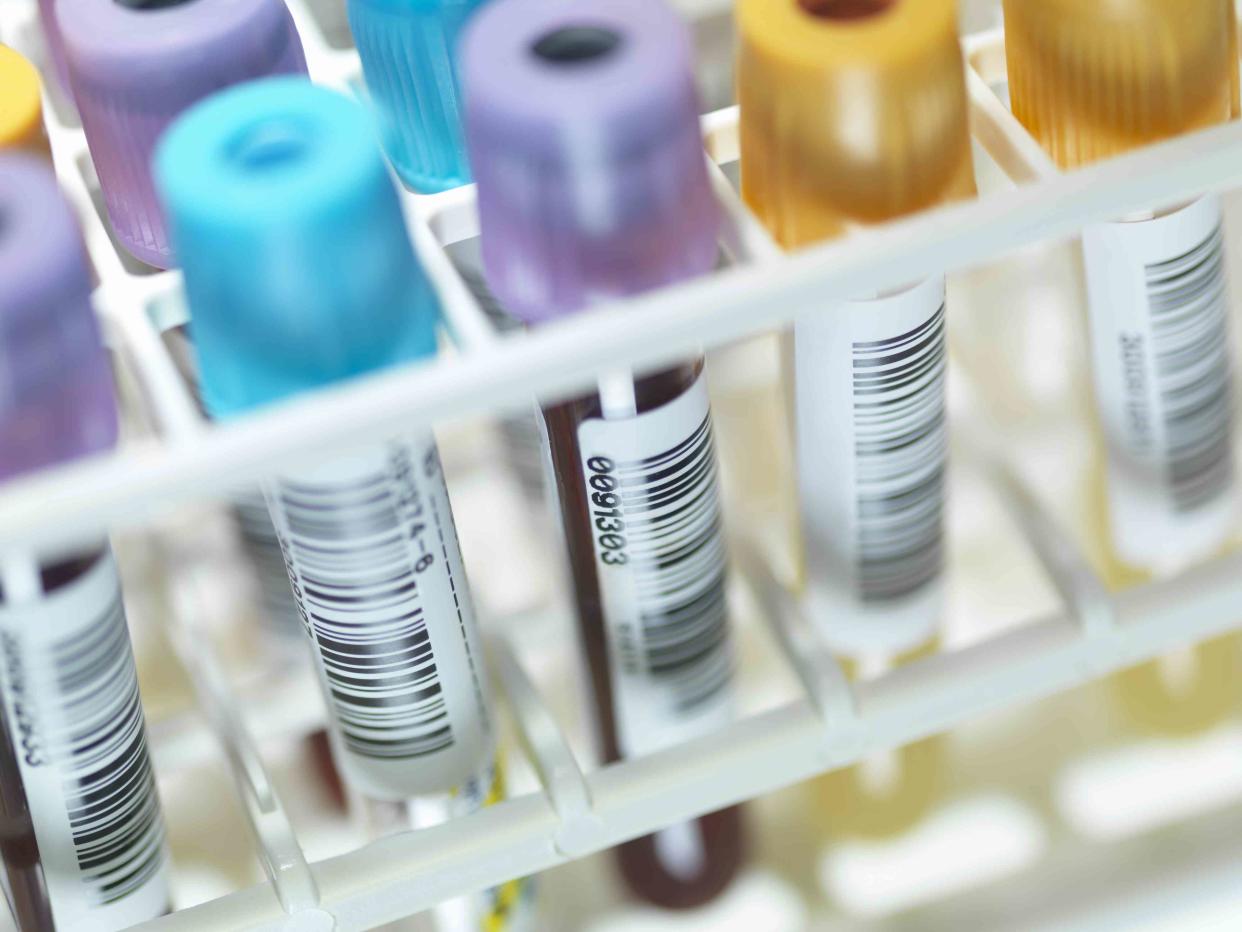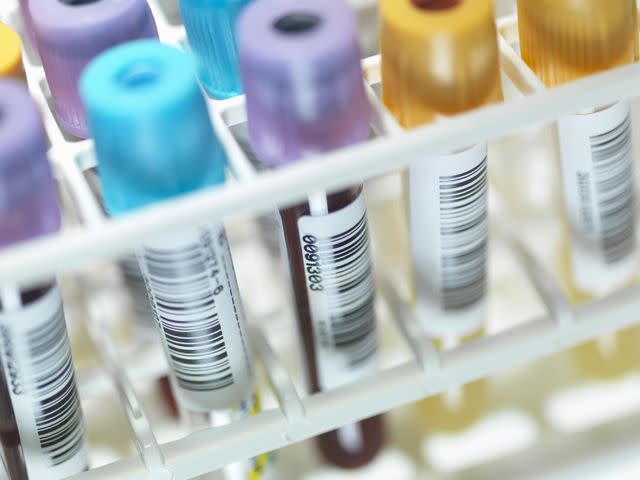Autoimmune Hemolytic Anemia: Everything You Need to Know

Andrew Brookes / Getty Images
Medically reviewed by David Ozeri, MD
Autoimmune hemolytic anemia (AIHA) is a rare autoimmune disorder that causes the body to mistake its own red blood cells (RBCs) for foreign substances. Then, your body’s immune system creates autoantibodies to destroy red blood cells before they can be replaced, leading to anemia (low red blood cell count).
Without the proper amount of red blood cells, you may experience symptoms like fatigue, shortness of breath, dizziness, and weakness. If untreated, autoimmune hemolytic anemia sometimes leads to severe complications like heart failure.
In this article, we’ll review everything you need to know about autoimmune hemolytic anemia, including types, risk factors, causes, symptoms, treatment options, and more.

Andrew Brookes / Getty Images
What Is Hemolysis?
Hemolysis is the breakdown of the body’s red blood cells, or erythrocytes. Typically broken down and removed by the spleen after around 110–120 days, red blood cells are sometimes destroyed too quickly.
When hemolysis is too rapid, whether because of medications, infection, an autoimmune disorder, or an underlying condition, it can lead to hemolytic anemia. This condition happens when not enough red blood cells are being made by the bone marrow, leading to a low red blood cell count. Depending on the cause, hemolytic anemia may develop quickly or gradually over time.
What Is Autoimmune Hemolytic Anemia (AIHA)?
Autoimmune hemolytic anemia is an autoimmune condition, meaning that it causes the body to mistakenly attack its own healthy tissues. In the case of AIHA, the body’s immune system attacks and destroys its own red blood cells.
Due to their low red blood cell count, people with AIHA may feel dizzy, light-headed, or weak. They also sometimes experience problems with their spleen, liver, or both.
AIHA is manageable when identified, diagnosed, and treated early. However, if left untreated, it can lead to serious and even fatal complications. The estimated one-year survival rate for people with AIHA is 79.5%. Health complications from unresolved AIHA may include:
Heart failure
Irregular heart rhythms (arrhythmia)
Types and Risk Factors
Autoimmune hemolytic anemia is a group of closely related disorders There are different types of autoimmune hemolytic anemia, including warm, cold, primary, and secondary AIHA.
Warm AIHA
Warm autoimmune hemolytic anemia is the most common type of AIHA. It causes the hemolysis of red blood cells by IgG antibodies at normal body temperature, about 98.6 degrees F. It can affect people at any age.
Potential complications of warm AIHA include an enlarged spleen, deep vein thrombosis (DVT), and pulmonary embolism.
Cold AIHA
Cold autoimmune hemolytic anemia, also known as cold agglutinin disease (CAD), involves the destruction of red blood cells by IgM antibodies at colder temperatures (usually around 37 to 39 degrees F).
Cold AIHA is less common than warm AIHA and typically affects people between 40 and 80 years old. Some people with cold AIHA develop problems with circulation, such as Raynaud’s syndrome.
Primary or Secondary AIHA
About 50% of people with autoimmune hemolytic anemia have primary AIHA, which means that it’s not due to any apparent comorbid condition or underlying cause. This is also known as idiopathic autoimmune hemolytic anemia.
Another 50% have secondary AIHA, which means that it develops because of an underlying related condition. Possible causes of secondary AIHA include malignancy (cancer), viruses, certain medications, and autoimmune disorders.
Other AIHA Causes
AIHA can be linked to other disorders, and can also be caused by:
Viral infections, such as Epstein-Barr virus (EBV), the flu, and certain kinds of pneumonia
Medications, such as certain antibiotics and nonsteroidal inflammatory drugs (NSAIDs)
Autoimmune conditions, such as systemic lupus erythematosus (SLE)
Certain cancers, such as chronic lymphocytic leukemia (CLL) or lymphoma
Tumors
Organ transplants
Hemolytic Anemia Symptoms
Because red blood cells carry oxygen throughout your body, a low red blood cell count can lead to a number of symptoms. Symptoms of hemolytic anemia include:
Weakness
Fatigue
Difficulty concentrating
Headache
Dizziness
Light-headedness
Difficulty breathing
Sore tongue
Pale skin
Enlarged liver or spleen
Dark urine
Heart palpitations
AIHA Diagnosis
To diagnose you with AIHA, your healthcare provider may perform a physical exam, bone marrow test, and/or blood tests. Blood tests for AIHA include:
Complete blood count: A complete blood count (CBC) measures various aspects of your blood, such as your white and red blood cell counts, your platelet count, and the amount of hemoglobin in your blood.
Coombs tests: Coombs tests look for antibodies in the blood that destroy red blood cells and cause anemia. The direct Coombs test looks for antibodies that are stuck to blood cells, while the indirect Coombs test tests for floating antibodies.
Reticulocyte test: This test measures the amount of reticulocytes (immature red blood cells) in your blood to see whether your bone marrow produces and replaces erythrocytes quickly enough.
Bilirubin test: This blood test allows healthcare providers to assess the health of your liver by measuring the amount of bilirubin, a substance made by your liver during the digestive process, in your blood.
Haptoglobin test: Haptoglobin tests measure the amount of haptoglobin in your blood. This protein binds to a certain type of hemoglobin, a red blood cell protein that carries oxygen.
Agglutinins tests: Agglutinins are antibodies that cause red blood cells to clump together. Your healthcare provider may diagnose you with warm AIHA if you have febrile agglutinins in your blood, while cold agglutinins may be a sign of cold AIHA.
Autoimmune Hemolytic Anemia Treatment
Autoimmune hemolytic anemia can be treated with medication, surgery, and/or blood transfusions.
Medication
Steroid therapy, particularly with prednisone, is the first line of treatment for most cases of AIHA. An estimated 80% of people with AIHA who are treated with glucocorticoids will see their symptoms resolve within up to three weeks. If your symptoms persist, you may be prescribed an immunosuppressant instead.
Rituximab, a type of monoclonal antibody, also treats autoimmune hemolytic anemia. It can be prescribed either alone or alongside prednisone to treat AIHA symptoms.
Surgery (Splenectomy)
If steroids and other medications don’t work, some people with warm AIHA may need to undergo a splenectomy. Splenectomy is the surgical removal of the spleen. An estimated 40%–90% of people with warm AIHA respond favorably after getting a splenectomy. However, the surgery has risks, such as blood clots and infections.
Blood Transfusion
If you have severe AIHA symptoms, your healthcare provider may recommend a blood transfusion to replace your red blood cells. Some people with AIHA will need to get blood transfusions on an ongoing basis if they continue to relapse.
Treatment for Warm vs. Cold AIHA
Warm AIHA is typically treated with steroids and/or rituximab. Meanwhile, cold AIHA doesn’t always require treatment. Mild cases of cold AIHA may resolve on their own. People with cold AIHA should stay out of the cold, as their red blood cells will be destroyed more quickly in cooler climates. In more severe cases, people with cold agglutinin disease (CAD) may need blood transfusions and/or rituximab. Splenectomies are typically not recommended for people with CAD.
AIHA in Children
Very few babies and children develop AIHA. Among those with childhood autoimmune hemolytic anemia, about 37% have primary AIHA and about 53% have secondary AIHA. Cold AIHA is especially rare in younger patients.
Children with secondary AIHA often develop the condition due to a comorbid (co-occurring) immune disorder, such as a platelet disorder called immune thrombocytopenia (ITP). Treatment for pediatric AIHA is similar to the treatment options for adults, with steroids as the first-line therapy.
AIHA Prevention
AIHA can’t always be prevented. However, if you are taking medication or have an underlying condition that can cause AIHA, your healthcare provider may be able to lower your risk by monitoring your symptoms carefully. You should also get an annual flu shot.
Also, talk to a healthcare provider right away if you have any symptoms of AIHA. Early treatment can resolve your condition and prevent complications.
Lifestyle Management for AIHA
If you have AIHA, it’s important to visit a healthcare provider regularly so they can monitor any conditions you have and prevent them from getting worse.
If you have ongoing symptoms or are taking steroids, your healthcare provider may also recommend that you take the following supplements:
Iron
Vitamin D
Calcium
Finally, if you have cold AIHA, avoiding cold environments and staying warm as much as possible is important.
Summary
Autoimmune hemolytic anemia is a condition that causes your body to break down red blood cells too quickly to be replaced. Symptoms include dizziness, weakness, rapid heart rate, headaches, jaundice, and an enlarged spleen or liver.
Primary AIHA has no underlying cause, while secondary AIHA can be caused by certain drugs, cancer, autoimmune disorders, or viral infections. Warm AIHA occurs when red blood cells break down at body temperature. Cold AIHA, the less common type, happens when red blood cells are destroyed at colder temperatures.
AIHA can usually be effectively treated with medication, such as steroids. Surgery or blood transfusions may be necessary if symptoms don’t improve.

